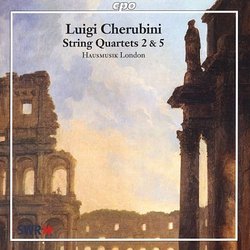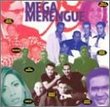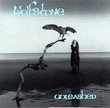| All Artists: Luigi Cherubini Title: Cherubini: String Quartets 2 & 5 Members Wishing: 0 Total Copies: 0 Label: Cpo Records Release Date: 3/14/2000 Genre: Classical Styles: Chamber Music, Historical Periods, Classical (c.1770-1830) Number of Discs: 1 SwapaCD Credits: 1 UPC: 761203946426 |
Search - Luigi Cherubini :: Cherubini: String Quartets 2 & 5
 | Luigi Cherubini Cherubini: String Quartets 2 & 5 Genre: Classical
|
Larger Image |
CD DetailsSimilar CDs
|
CD ReviewsA Good Entree to Cherubini's String Quartets M. C. Passarella | Lawrenceville, GA | 03/13/2006 (5 out of 5 stars) "If you want an entree to the string quartets of Cherubini or if your budget allows for only a representative sampling, this disc may just be the one for you. First of all, it contains (I believe) Cherubini's finest effort in the genre, No. 5. Second, it features an interesting reworking of Cherubini's own undervalued Symphony in D of 1815. Composers of symphonies in this period seem either to be criticized for sounding too much like Beethoven or not enough like Beethoven. Certainly, the latter is the case with Cherubini's only symphony. Why he decided to recast it as a string quartet is unknown (at least I don't know why from what I've read), but the inevitable judgment of his contemporaries was that the darn thing didn't work as a symphony, and he knew it. His solution was to rework it in a form he hoped would be more congenial. Well, that may be. The symphony is certainly more lyrical than Beethoven's or Haydn's generally are, and maybe that cantabile, quasi-operatic approach makes more sense in the guise of a string quartet. In any event, I like this music in both its symphonic and its string-quartet incarnations.
Finding the slow movement of the symphony inappropriate for his string-quartet version, Cherubini created a new slow movement that is interestingly obtuse, as Schumann observed. Its outer sections are emotionally elusive (though based on a lovely melody that Schumann identified as "Provencal"), its middle section fiery and resolute, making for an odd sort of mix. It stays in the mind, though. The Fifth Quartet has a first movement of classical grace and refinement that recalls Cherubini's fine overture to his opera "Anacreon," and it has a brief slow movement that is almost dainty, especially for Cherubini, who usually prefers the grand manner. This slow movement develops as a series of free variations on a simple melody that grows in stature as the music unfolds. The last two movements have an elegant dash and playfulness about them that recall the Mendelssohn of the Opus 44 Quartets, which the German composer was working on about the same time Cherubini finished his quartet (1837). I'm sure we can't say that one composer influenced the other, so instead, let's chalk it up to the "great minds think alike" phenomenon. I've read good things about the rival version of the Cherubini quartets from the David Quartet on BIS, but I find Hausmusik just about perfect for the assignment. They capture that Mendelssohnian grace as well as they do the patrician high-Classical manner that is Cherubini's usual stance. Hausmusik makes this music sound every bit as important as I think it is, a meaningful and attractive bridge between the work of Beethoven and the classical Romanticists such as Mendelssohn, Schumann, and Brahms. CPO's recording is big and crisp, nicely resonant without being unduly so." |

 Track Listings (8) - Disc #1
Track Listings (8) - Disc #1


